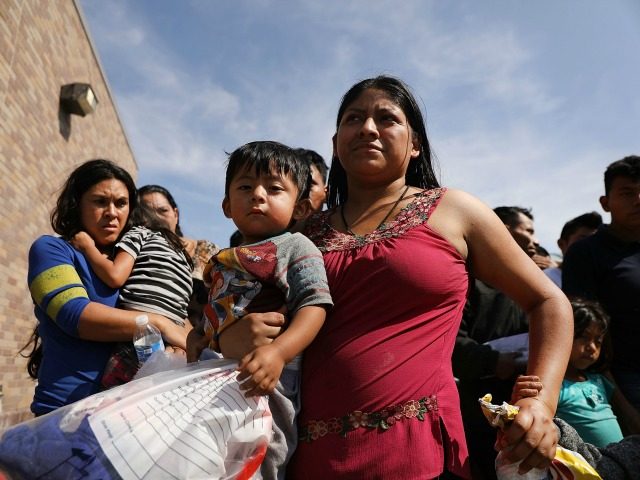A large percentage of migrants are being turned away at the border because of the new asylum policy set by Attorney General Jeff Sessions, say immigration lawyers.
“Every single case has been denied by the asylum office,” said a tweet from one immigration lawyer:
Met with over twenty people today … Went to court for two hearings & told I had no role and should be quiet. Told mental health of the parent doesn’t matter. Each case was denied by the judge.
The change is caused by new asylum policy from Attorney General Jeff Sessions, which is designed to complement his policy of prosecuting all migrants who try to sneak through the border.
His July 11 asylum reform raises the bar by denying asylum to migrants who claim persecution from spouses and criminal gangs. Once rejected, the migrants cannot use the catch-and-release loopholes to get jobs in U.S. cities.
Under President Barack Obama, 80 percent of migrants passed the initial test, many by declaring “credible fear” of criminals and spouses. From October 2017 to September 2017, 60,000 of 80,000 migrants passed their credible fear tests, according to DHS data. The Associated Press reported:
In 2010, the Obama administration began allowing many immigrants passing credible fear interviews to remain free while their asylum cases progressed. The number of asylum seekers spiked, with federal authorities referring nearly 92,000 people for credible fear interviews during the 2016 fiscal year, compared to about 5,000 nine years earlier.
Obama’s low bar triggered a wave of half a million migrants from Central America, backlogged the courts with more than 300,000 claims and delivered 400,000 new legal employees to low-wage American businesses. The vast majority of Obama’s migrants flooded into working-class districts, swamped Americans’ labor market and packed Americans’ public schools with children who do not speak English.
The new reports from lawyers suggest that pass-rate of 75 percent has fallen dramatically as President Donald Trump and AG Sessions work to curb economic migration from Central America.
“This is for me, based on the number of years I’ve been doing this, I haven’t seen the denials at this rate ever,” Carlos Garcia, an immigration lawyer in McAllen, Texas, told CNN. He added:
In years past I would say … the approval rates were much higher. In addition, not just years past, months past. As soon as just a couple of months ago.
The Associated Press reported that Sofia Casini, a staffer at a pro-migration group in Austin, Texas, said the denial rate has doubled since Session’s reform. Her group is working with the some of the 2,500 parents held under the government’s zero-tolerance policy, and one-third of 35 separated parents were denied the opportunity to file for asylum, said the AP.
AP described the new process:
Patricia Aragon told the U.S. asylum officer at her recent case assessment that she was fleeing her native Honduras because she had been robbed and raped by a gang member who threatened to kill her and her 9-year-old daughter if she went to the police.
Until recently, the 41-year-old seamstress from San Pedro Sula would have had a good chance of clearing that first hurdle in the asylum process due to a “credible fear” for her safety, but she didn’t. The officer said the Honduran government wasn’t to blame for what happened to Aragon and recommended that she not get asylum, meaning she’ll likely be sent home.
The decisions made in the “credible-fear” interviews are being backed up by the judges who handle appeals in the immigraiton system, said the AP.
Once migrants are denied in their initial “credible fear” test, they are prevented from using the “catch and release” loopholes and are instead slated for a quick return to their homeland.
Pro-migration groups are hoping to a federal lawsuit can overturn Sessions’ new policy. According to CNN:
Greg Chen, director of government relations for the immigration lawyers’ association, agreed the process could take weeks to months and could be hampered by having to find people who are actually harmed. He said association attorneys and other advocates would likely need to send researchers into the field near and across the Mexico border to try to find people affected, as they could be deported far too quickly to find attorneys in the US.

COMMENTS
Please let us know if you're having issues with commenting.